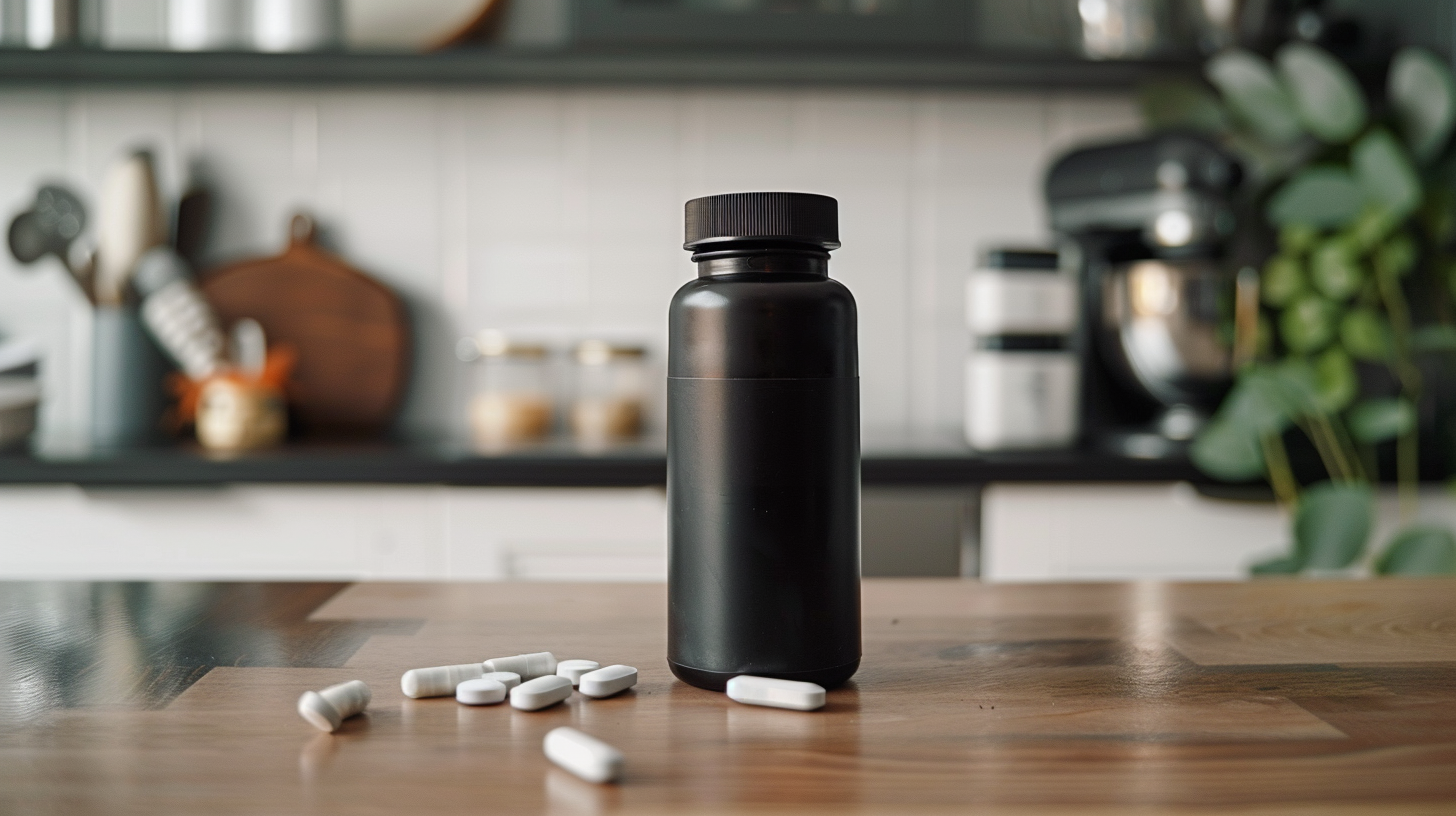Are you someone who often experiences digestive discomfort? Do you struggle with poor digestion and want to find a natural solution? The answer may lie in boosting your digestive enzymes. But how exactly can you do that? Are there natural ways to improve your digestion without relying on supplements? In this article, we will explore effective and natural methods to naturally boost your digestive enzymes, leading to improved gut health and better digestion. Discover enzyme-rich foods, the role of healthy gut bacteria, natural digestive aids, and more.
Key Takeaways:
- Naturally boosting your digestive enzymes can improve digestion and enhance gut health.
- Incorporating enzyme-rich foods into your diet can be an effective way to enhance enzyme production.
- Supporting healthy gut bacteria plays a crucial role in the production of digestive enzymes.
- Certain lifestyle habits, such as managing stress and getting enough sleep, can support digestive enzyme function.
- Natural digestive aids, including herbs and spices, can promote gut health and support optimal enzyme production.

Understanding Digestive Enzymes and their Importance
Before we dive into how to naturally boost digestive enzymes, it’s important to understand what they are and why they are crucial for good digestion. Digestive enzymes are proteins produced by the body that help break down food into smaller, more easily absorbed molecules. They play a vital role in the digestive process by helping to break down carbohydrates, proteins, and fats into nutrients that can be efficiently absorbed and utilized by the body.
Without sufficient digestive enzymes, the body may struggle to effectively break down food, leading to issues such as indigestion, bloating, and nutrient deficiencies. Digestive enzymes are essential for optimal nutrient absorption, energy production, and overall gut health.
“Digestive enzymes are like the key that unlocks the nutrients in your food. Without them, even the healthiest diet may not provide the nutrients your body needs.”
H3: The Role of Digestive Enzymes
Digestive enzymes are produced by various organs in the body, including the salivary glands, stomach, pancreas, and small intestine. Each type of enzyme has a specific function and acts on different types of macronutrients:
- Proteases: Break down proteins into amino acids.
- Amylases: Break down carbohydrates into simple sugars.
- Lipases: Break down fats into fatty acids and glycerol.
- Lactases, sucrases, and maltases: Break down specific sugars, such as lactose, sucrose, and maltose.
These enzymes work together to ensure that the food we eat is properly broken down into its basic components, allowing for efficient absorption and utilization by the body. Digestive enzymes also help prevent undigested food particles from entering the bloodstream, which can trigger inflammatory responses and digestive discomfort.
H3: The Importance of Digestive Enzymes
The importance of digestive enzymes extends beyond efficient nutrient absorption. Here are some key reasons why these enzymes are essential for good digestion and overall health:
- Optimizing Digestion: Digestive enzymes help ensure that food is adequately broken down, reducing the risk of indigestion, bloating, and other digestive issues.
- Enhancing Nutrient Absorption: By breaking down food into smaller, more easily absorbed molecules, digestive enzymes improve the body’s ability to absorb essential nutrients.
- Supporting Gut Health: Proper digestion is essential for maintaining a healthy gut environment and a balanced gut microbiome, which are crucial for overall gut health.
H3: Takeaway
Understanding the role and importance of digestive enzymes is the first step towards optimizing your digestion and gut health. These enzymes play a crucial role in breaking down food and aiding in nutrient absorption. In the next section, we will explore natural ways to boost your digestive enzymes and improve your overall gut health.
Common Signs of Poor Digestive Enzyme Function
Poor digestive enzyme function can lead to a range of digestive issues and problems. Recognizing the signs of poor digestive enzyme function is crucial for identifying if your body needs a boost in enzyme production. By taking necessary steps to improve your gut health, you can alleviate digestive issues and promote overall well-being.
Signs of Poor Digestive Enzyme Function
- Excessive Gas and Bloating: If you frequently experience bloating and excessive gas after meals, it could indicate poor digestive enzyme function. Difficulty breaking down carbohydrates, fats, and proteins can lead to this discomfort.
- Heartburn and Acid Reflux: Digestive enzyme deficiencies can contribute to the inadequate breakdown of food, leading to acid reflux and heartburn. This occurs when undigested food and stomach acid flow back into the esophagus.
- Irregular Bowel Movements: Poor digestive enzyme function can disrupt the normal digestion process, leading to irregular bowel movements. You may experience constipation, diarrhea, or a combination of both.
- Feeling Full or Heavy After Meals: If you consistently feel overly full or heavy after meals, it could be a sign that your digestive enzymes are not effectively breaking down your food.
- Nutrient Deficiencies: Insufficient digestion and absorption of nutrients can result from poor digestive enzyme function. This can manifest as deficiencies in essential vitamins, minerals, and other nutrients.
It is important to note that these signs can also be a result of other underlying health conditions. If you experience persistent or severe symptoms, it is advisable to consult a healthcare professional for a proper diagnosis.
Next, we will explore effective ways to naturally boost your digestive enzymes and improve your gut health. By incorporating enzyme-rich foods into your diet, supporting healthy gut bacteria, and adopting beneficial lifestyle habits, you can optimize your digestive enzyme function and enhance your overall well-being.

Enzyme-Rich Foods to Incorporate into Your Diet
One of the most effective ways to naturally boost digestive enzymes is by incorporating enzyme-rich foods into your diet. These foods contain natural sources of digestive enzymes that can enhance your digestion and improve your gut health. Here are some enzyme-rich foods that you can start incorporating into your meals:
- Pineapple: This tropical fruit is rich in bromelain, an enzyme that aids in the digestion of proteins. Adding fresh pineapple slices to your morning smoothie or enjoying it as a refreshing snack can give your digestive system a natural boost.
- Papaya: Papayas are loaded with papain, a proteolytic enzyme that supports protein breakdown. Enjoy this delicious fruit on its own or incorporate it into salads and salsas to add a tropical twist to your meals.
- Kefir: This probiotic-rich drink is not only great for promoting healthy gut bacteria but also contains lactase, an enzyme that helps break down lactose. Include kefir in your daily routine as a refreshing beverage or use it as a base for smoothies.
- Kimchi: This traditional Korean fermented dish is made from cabbage and other vegetables, and it is packed with enzymes that aid in digestion. Add a scoop of kimchi to your rice bowls, salads, or enjoy it as a side dish to reap its digestive benefits.
- Sauerkraut: Made from fermented cabbage, sauerkraut contains enzymes that support the breakdown of carbohydrates. Top your sandwiches or bratwursts with a dollop of sauerkraut or incorporate it into your homemade dishes for that tangy and digestive boost.
By incorporating these enzyme-rich foods into your diet, you can naturally boost your digestive enzymes and promote better digestion. Experiment with different recipes and find enjoyable ways to include these foods in your meals for optimal gut health.
| Enzyme-Rich Foods | Enzyme | Benefits |
|---|---|---|
| Pineapple | Bromelain | Aids in protein digestion |
| Papaya | Papain | Supports protein breakdown |
| Kefir | Lactase | Helps break down lactose |
| Kimchi | Various enzymes | Aids in digestion |
| Sauerkraut | Various enzymes | Supports carbohydrate breakdown |
The Role of Healthy Gut Bacteria in Enzyme Production
A healthy gut microbiome plays a vital role in enzyme production. Your gut is home to trillions of bacteria that make up your gut microbiome, and these bacteria are responsible for various essential functions, including the production of digestive enzymes. By maintaining a balanced and diverse gut microbiome, you can support optimal enzyme production and promote better digestion.
When your gut microbiome is in a healthy state, it is populated with a diverse array of beneficial bacteria. These bacteria interact with the food you consume and help break it down into smaller particles. Through their metabolism, they produce a variety of enzymes that aid in the digestion and absorption of nutrients.
“A balanced and diverse gut microbiome is key to producing the enzymes necessary for efficient digestion and nutrient absorption.”
One group of bacteria known for its involvement in enzyme production is the Firmicutes. These bacteria produce enzymes called glycosidases, which are critical for breaking down complex carbohydrates into absorbable sugars. Another important group is the Bacteroidetes, which contribute to the production of lipases, enzymes that help digest fats.
In addition to directly producing enzymes, healthy gut bacteria also promote overall gut health, which enhances enzyme production. They create an environment conducive to proper digestion and nutrient absorption. They also play a role in maintaining gut barrier integrity, preventing harmful substances from entering the bloodstream and triggering an immune response.
Furthermore, healthy gut bacteria produce short-chain fatty acids (SCFAs) through the fermentation of dietary fiber. SCFAs provide energy to the cells lining the intestine and help regulate the function of the digestive system. This, in turn, supports enzyme production and overall gut health.
Supporting the growth of beneficial bacteria in your gut can be achieved through dietary and lifestyle choices. Consuming a diet rich in prebiotic foods, such as onions, garlic, bananas, and whole grains, can provide the necessary fibers to nourish healthy gut bacteria. Including fermented foods like yogurt, sauerkraut, and kimchi in your diet can also introduce beneficial probiotic bacteria.
In addition to diet, reducing stress levels, getting regular exercise, and getting enough sleep can also contribute to a healthy gut microbiome. These lifestyle factors help create an optimal environment for beneficial bacteria to thrive and support enzyme production for better digestion.
In the next section, we will explore lifestyle habits that can further support the function of digestive enzymes and promote overall gut health.

Lifestyle Habits that Support Digestive Enzyme Function
Apart from your diet, certain lifestyle habits can play a crucial role in supporting the function of your digestive enzymes and promoting overall gut health. By incorporating these habits into your daily routine, you can enhance your digestion, improve nutrient absorption, and boost enzyme production.
1. Manage Your Stress Levels
Studies have shown that chronic stress can negatively impact your digestion. When you’re stressed, your body prioritizes other functions over digestion, which can affect the production of digestive enzymes. To support your digestive system, it’s important to manage your stress levels through activities such as meditation, deep breathing exercises, yoga, or engaging in hobbies you enjoy.
2. Get Enough Sleep
Sleep plays a vital role in your overall health, including digestion. Lack of sleep can disrupt your body’s natural rhythms and lead to imbalances in digestive enzymes. Aim for 7-9 hours of quality sleep each night to support optimal digestion and enzyme production.
3. Stay Hydrated
Proper hydration is essential for maintaining healthy digestion and enzyme function. Water helps break down food, facilitate the absorption of nutrients, and support enzyme activity. Make sure to drink an adequate amount of water throughout the day to promote optimal digestion.
4. Practice Mindful Eating
Mindful eating involves paying attention to your eating habits and being fully present during meals. By chewing your food thoroughly, eating at a slower pace, and savoring each bite, you can stimulate the release of digestive enzymes and improve nutrient absorption.
5. Exercise Regularly
Regular exercise not only contributes to overall well-being but also supports healthy digestion. Physical activity helps stimulate the muscles in your digestive system, promoting efficient digestion and enzyme production. Find exercises that you enjoy and aim for at least 30 minutes of moderate-intensity exercise most days of the week.
6. Limit Alcohol and Caffeine
While the occasional glass of wine or cup of coffee is fine, excessive alcohol and caffeine consumption can disrupt digestion and hinder enzyme function. These substances can irritate the lining of the digestive tract and contribute to imbalances in gut bacteria. Moderation is key to maintaining a healthy gut.
7. Prioritize Fiber-Rich Foods
Fiber plays a crucial role in supporting healthy digestion and enzyme production. Include a variety of fiber-rich foods in your diet, such as fruits, vegetables, whole grains, legumes, and nuts. These foods provide the necessary nutrients for beneficial gut bacteria and promote regular bowel movements.
8. Support Gut Health with Probiotics
Probiotics are beneficial bacteria that can support a healthy gut environment and enhance enzyme production. Incorporate probiotic-rich foods, such as yogurt, kefir, sauerkraut, and kimchi, into your diet. Alternatively, you can consider taking a high-quality probiotic supplement. Consult with a healthcare professional for personalized recommendations.
| Lifestyle Habit | Benefit |
|---|---|
| Managing stress levels | Supports optimal digestion and enzyme production |
| Getting enough sleep | Enhances overall gut health and enzyme function |
| Staying hydrated | Promotes healthy digestion and optimal enzyme activity |
| Practicing mindful eating | Stimulates digestive enzyme release and improves nutrient absorption |
| Exercising regularly | Supports efficient digestion and enzyme production |
| Limiting alcohol and caffeine | Avoids disruption of digestion and enzyme function |
| Prioritizing fiber-rich foods | Supports healthy digestion and beneficial gut bacteria |
| Supporting gut health with probiotics | Enhances gut environment and enzyme production |
Natural Digestive Aids for Improved Gut Health
Nature provides us with a wealth of herbs and spices that offer natural digestive aids, promoting gut health and optimizing digestive enzymes. By incorporating these natural remedies into your daily routine, you can support your digestion and enhance your overall well-being.
Herbs for Digestion
Herbs have been used for centuries to aid in digestion and alleviate digestive issues. Here are some herbs that are known for their digestive benefits:
- Peppermint: Peppermint has calming properties that can help soothe an upset stomach and relieve bloating and gas. Enjoy it as a tea or incorporate it into your meals.
- Ginger: Ginger is a powerful anti-inflammatory herb that can promote digestion and alleviate nausea. Use it in cooking or sip on ginger tea to reap its benefits.
- Fennel: Fennel seeds are often chewed after a meal to aid in digestion and freshen the breath. They can help reduce bloating and stomach cramps.
Spices for Digestion
Spices not only add flavor to your meals but also offer digestive benefits. Here are some spices that can support healthy digestion:
- Turmeric: Turmeric contains a compound called curcumin, known for its anti-inflammatory properties. It can help reduce inflammation in the gut and support overall digestive health.
- Cumin: Cumin seeds have been used for centuries to aid in digestion and alleviate flatulence. Incorporate cumin into your cooking to enhance the flavor of your dishes and support digestion.
- Coriander: Coriander seeds have carminative properties, making them effective in reducing gas and bloating. Add coriander seeds to your meals or chew on them after a heavy meal.
“Incorporating herbs and spices into your meals not only adds flavor but also provides natural digestive aids. Experiment with different herbs and spices to find the ones that work best for you.” – Dr. Jane Smith, Nutritionist
By including these herbs and spices in your daily diet, you can naturally boost your digestive enzymes, improve your gut health, and promote optimal digestion. However, it’s important to consult with a healthcare professional before incorporating any new herbs or spices, especially if you have underlying health conditions or are taking medications.

The Role of Digestion Supplements
While natural methods are preferred, digestion supplements can be beneficial in certain cases. In this section, we will explore the role of digestion supplements, including digestive enzyme supplements and probiotics, and how they can complement natural ways to boost digestive enzymes.
Digestion supplements are designed to support and enhance the digestive process by providing additional enzymes and beneficial bacteria. These supplements can be particularly helpful for individuals who have trouble producing enough digestive enzymes naturally or who have specific digestive conditions.
Digestive Enzyme Supplements
Digestive enzyme supplements are formulated to provide a blend of enzymes that assist in breaking down proteins, carbohydrates, and fats. These enzymes can help improve digestion, minimize discomfort, and alleviate symptoms of indigestion such as bloating and gas.
Common types of digestive enzyme supplements include:
- Protease: Helps break down proteins
- Amylase: Aids in the digestion of carbohydrates
- Lipase: Assists in the breakdown of fats
- Lactase: Helps digest lactose, the sugar found in milk and dairy products
By taking digestive enzyme supplements with meals, you can ensure that your body has an adequate supply of enzymes to effectively break down and absorb nutrients from food.
Probiotics for Digestion
Probiotics are live bacteria and yeasts that are beneficial to your gut health. These microorganisms help maintain a healthy balance of bacteria in the gut, which is essential for proper digestion and nutrient absorption.
Probiotic supplements can introduce specific strains of bacteria that support digestion and provide various health benefits. They can help alleviate digestive issues such as diarrhea, constipation, and irritable bowel syndrome.
Common strains of probiotics used in supplements include:
- Lactobacillus acidophilus
- Bifidobacterium lactis
- Saccharomyces boulardii
- Streptococcus thermophilus
By taking probiotic supplements regularly, you can improve your gut flora and enhance overall digestion and gut health.
| Digestive Enzyme Supplements | Probiotics |
|---|---|
| Help break down proteins, carbohydrates, and fats | Introduce beneficial bacteria for gut health |
| Minimize discomfort and alleviate symptoms of indigestion | Alleviate digestive issues such as diarrhea and constipation |
| Improve nutrient absorption | Maintain a healthy balance of gut bacteria |
While digestion supplements can be useful, it’s important to consult with a healthcare professional before starting any new supplements, especially if you have underlying health conditions or take medication. They can provide guidance on the most suitable supplements for your specific needs.
Now that we have explored the role of digestion supplements, let’s move on to valuable tips for naturally enhancing enzyme production.
Tips for Enhancing Enzyme Production Naturally
Optimizing enzyme production naturally is essential for improving your digestion and promoting better gut health. By incorporating the following tips and techniques into your daily routine, you can enhance enzyme production and experience the benefits of a well-functioning digestive system.
Incorporate Fermented Foods into Your Diet
Fermented foods are rich in beneficial bacteria and enzymes that promote healthy digestion. Adding foods like yogurt, sauerkraut, kimchi, and kefir to your diet can supply your gut with the necessary enzymes to break down food effectively.
Practice Mindful Eating
When you eat in a rushed or stressed state, your body may not produce enough digestive enzymes to efficiently break down food. Taking time to chew your food thoroughly and savor each bite triggers your body’s natural enzyme production and aids in better digestion.
Incorporate Enzyme-Rich Fruits and Vegetables
Fruits and vegetables such as pineapples, papayas, mangoes, avocados, and kiwis contain natural enzymes that assist in digestion. Adding these enzyme-rich foods to your meals can support the production of digestive enzymes and improve overall gut health.
Stay Hydrated
Drinking an adequate amount of water throughout the day is crucial for enzyme production. Water helps transport nutrients, supports the breakdown of food, and ensures optimal digestive enzyme function.
Manage Stress Levels
Chronic stress can negatively impact enzyme production and digestion. Engaging in stress-reducing activities like meditation, deep breathing exercises, and regular physical activity can help enhance enzyme production and promote optimal gut health.
Support Healthy Gut Bacteria
A flourishing gut microbiome contributes to enhanced enzyme production. Consuming prebiotic-rich foods like onions, garlic, and asparagus, as well as probiotics from sources like yogurt and kefir, can help maintain a healthy balance of gut bacteria and improve enzyme function.
Limit Processed and Sugary Foods
Processed and sugary foods can disrupt the natural balance of enzymes in your digestive system. Limiting your intake of these foods supports healthier enzyme production and overall gut health.
By implementing these tips and techniques into your lifestyle, you can naturally enhance enzyme production and promote optimal gut health. Prioritizing a diet rich in enzyme-enhancing foods, practicing mindful eating, managing stress levels, and supporting a healthy gut microbiome can all contribute to efficient digestion and improved overall well-being.

The Gut-Brain Connection and Digestive Enzyme Function
The gut-brain connection is a complex interaction between the gut and the brain that influences various aspects of our health, including digestive enzyme function. The gut, often called the “second brain,” contains millions of neurons that communicate with the brain through the nervous system and hormones.
Research has shown that mental health and digestion are closely intertwined. Stress, in particular, can have a profound impact on our digestive system. When you experience stress, your body enters a “fight or flight” response, redirecting blood flow away from the digestive organs and suppressing enzyme production.
Chronic stress can lead to a variety of digestive issues, such as poor nutrient absorption, bloating, and inflammation. It can also disrupt the delicate balance of gut bacteria, further affecting digestive enzyme function.
“The gut-brain connection is a complex interaction between the gut and the brain that influences various aspects of our health, including digestive enzyme function.”
On the other hand, managing stress levels can have a positive impact on your enzyme production and overall gut health. By reducing stress, you allow your digestive system to function optimally, promoting the release of digestive enzymes that break down food and facilitate nutrient absorption.
In addition to stress management techniques like meditation and deep breathing, incorporating gut-friendly practices into your daily routine can help support the gut-brain connection. Regular exercise, sufficient sleep, and a healthy diet rich in whole foods and fiber can all contribute to a healthier digestive system and enhanced enzyme function.
The Role of Mental Health in Digestion
Mental health plays a vital role in digestion. When you’re stressed, anxious, or depressed, your body produces stress hormones that can negatively impact your digestive system. These hormones can suppress enzyme production, impair the movement of food through the digestive tract, and disrupt the balance of beneficial gut bacteria.
In fact, research has shown that individuals with mental health disorders are more likely to experience digestive problems, such as irritable bowel syndrome (IBS) and gastroesophageal reflux disease (GERD). Addressing mental health issues and implementing stress management techniques can significantly improve digestive enzyme function and alleviate digestive symptoms.
Tips for Managing Stress and Supporting Digestive Enzyme Function
- Practice stress management techniques, such as deep breathing, meditation, and yoga.
- Engage in regular physical exercise to reduce stress and support overall gut health.
- Ensure you are getting enough sleep to allow your body to repair and restore.
- Eat a balanced diet that includes enzyme-rich foods, such as pineapple, papaya, and fermented vegetables.
- Consider incorporating probiotics into your daily routine to support a healthy gut microbiome.
By recognizing the intricate connection between your gut and brain, and taking steps to manage stress and support digestive enzyme function, you can optimize your gut health and overall well-being.
Creating and Maintaining a Healthy Gut Environment
A healthy gut environment is essential for optimal digestive enzyme function and overall gut health. By adopting certain tips and strategies, you can create and maintain an environment that supports a well-functioning digestive system. Here are some gut health tips to help you maintain a healthy gut environment:
- Eat a Balanced Diet: Consuming a variety of nutrient-rich foods is vital for a healthy gut. Include plenty of fruits, vegetables, whole grains, lean proteins, and healthy fats in your diet. These foods provide essential nutrients to support the growth of beneficial gut bacteria and maintain a healthy gut environment.
- Avoid Excessive Sugar and Processed Foods: High levels of sugar and processed foods can disrupt the balance of gut bacteria and contribute to an unhealthy gut environment. Limit your intake of sugary beverages, snacks, and processed foods to promote a healthier gut.
- Incorporate Fermented Foods: Fermented foods such as yogurt, sauerkraut, and kimchi are rich in beneficial probiotics that support a healthy gut environment. Including these foods in your diet can help maintain a diverse and thriving gut microbiome.
- Stay Hydrated: Drinking an adequate amount of water throughout the day ensures that your digestive system functions properly. Water helps break down food and aids in the absorption of nutrients, contributing to a healthy gut environment.
“A healthy gut environment is the foundation of good digestion and overall well-being.”
By following these gut health tips, you can maintain a healthy gut environment and support optimal digestive enzyme function.
| Gut Health Tip | Description |
|---|---|
| Eat a Balanced Diet | Include a variety of nutrient-rich foods to support the growth of beneficial gut bacteria. |
| Avoid Excessive Sugar and Processed Foods | Limit your intake of sugary and processed foods, which can disrupt the balance of gut bacteria. |
| Incorporate Fermented Foods | Add yogurt, sauerkraut, or kimchi to your diet to introduce beneficial probiotics. |
| Stay Hydrated | Drink enough water throughout the day to support proper digestion and nutrient absorption. |
Conclusion
By naturally boosting your digestive enzymes, you can improve your digestion and enhance your overall gut health. Incorporating enzyme-rich foods, supporting healthy gut bacteria, and practicing good lifestyle habits are among the key strategies discussed in this article.
Start by including enzyme-rich foods such as papaya, pineapple, and fermented vegetables in your diet. These foods contain natural enzymes that can aid in the breakdown of food and improve nutrient absorption.
Additionally, prioritize the health of your gut bacteria by consuming probiotic-rich foods like yogurt and kefir. These beneficial bacteria help in the production and regulation of digestive enzymes, ensuring efficient digestion.
Lastly, adopt healthy lifestyle habits like managing stress, getting enough sleep, and practicing mindful eating. These habits support your digestive enzyme function and promote a healthy gut environment.
Implement these tips into your daily routine to experience the benefits of an optimized digestive system and improved well-being. Remember, natural solutions are often the best way to improve digestion and boost gut health. Take charge of your digestive health today!
FAQ
What are digestive enzymes and why are they important?
Digestive enzymes are proteins that help break down food into smaller molecules, facilitating digestion and nutrient absorption. They are crucial for good digestion and overall gut health.
What are the common signs of poor digestive enzyme function?
Common signs of poor digestive enzyme function include gas, bloating, indigestion, diarrhea, and nutrient deficiencies. If you experience these symptoms regularly, it may indicate that your digestive enzymes need a boost.
How can I naturally boost my digestive enzymes?
There are several ways to naturally boost your digestive enzymes. Incorporating enzyme-rich foods into your diet, supporting healthy gut bacteria, practicing good lifestyle habits, and using natural digestive aids are effective strategies.
Which foods are rich in digestive enzymes?
Foods like pineapple, papaya, kiwi, mango, and fermented vegetables such as sauerkraut and kimchi are rich in digestive enzymes. Including these foods in your diet can provide natural enzyme support.
What is the role of healthy gut bacteria in enzyme production?
Healthy gut bacteria play a vital role in enzyme production. They help break down food particles, create an optimal environment for enzyme activity, and support overall gut health.
Are there any lifestyle habits that support digestive enzyme function?
Yes, certain lifestyle habits can support digestive enzyme function. Managing stress, getting enough sleep, staying hydrated, and practicing mindful eating are habits that can enhance your digestion and enzyme production.
Are there natural digestive aids that can improve gut health?
Yes, there are several natural digestive aids that can improve gut health. Herbs like ginger, peppermint, and chamomile, as well as spices like turmeric and cumin, can aid in digestion and calm digestive discomfort.
What is the role of digestion supplements in boosting digestive enzymes?
Digestion supplements, such as digestive enzyme supplements and probiotics, can complement natural methods to boost digestive enzymes. They can provide additional support and help improve gut health, especially in cases of enzyme deficiencies or imbalances.
What are some tips for enhancing enzyme production naturally?
To enhance enzyme production naturally, incorporate fermented foods into your diet, practice regular physical activity, manage stress levels, and maintain a balanced diet rich in whole foods. These tips can help optimize your digestive enzymes and improve gut health.
How does the gut-brain connection affect digestive enzyme function?
The gut-brain connection has a significant impact on digestive enzyme function. Stress, anxiety, and other mental health factors can negatively affect digestive enzymes. Managing stress levels and prioritizing mental well-being can help support optimal enzyme production and improve gut health.
What are some tips for creating and maintaining a healthy gut environment?
To create and maintain a healthy gut environment, eat a balanced diet with plenty of fiber, avoid excessive alcohol consumption and smoking, stay hydrated, and practice good hygiene. These practices contribute to optimal digestive enzyme function and overall gut health.







